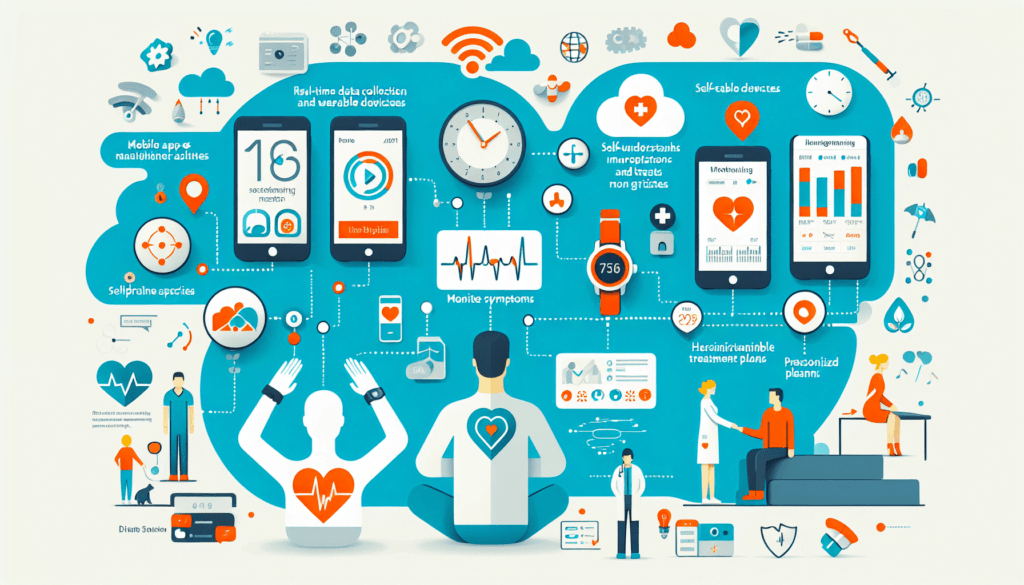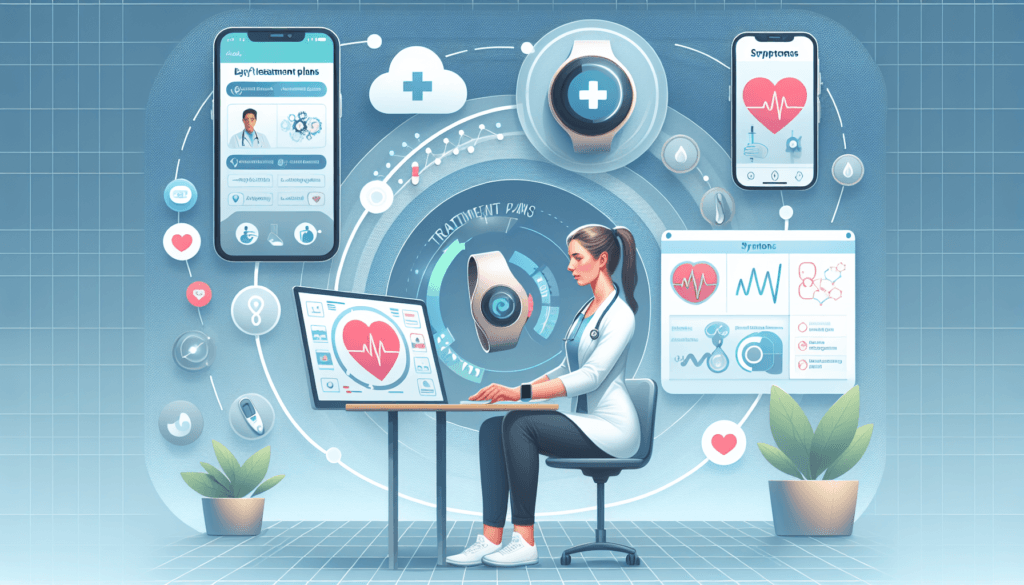In today’s digital age, managing allergies and asthma has become more convenient and efficient with the help of advanced technological tools. With the constant evolution of digital platforms and applications, individuals are empowered to take control of their health and effectively manage their allergy and asthma symptoms. From mobile apps that provide real-time pollen forecasts to smart inhalers that track medication usage, these digital tools offer valuable insights and support to improve the overall management of allergies and asthma. By harnessing the power of technology, individuals can now better understand their triggers, track their symptoms, and receive tailored recommendations, ultimately leading to a better quality of life.

Table of Contents
Digital Tools for Tracking Symptoms
Symptom tracking apps
Symptom tracking apps are valuable resources for individuals managing allergies and asthma. These apps allow users to log their symptoms, track their frequency and severity, and identify patterns or triggers. By keeping a digital record of symptoms, individuals can better understand their health patterns and communicate effectively with healthcare providers. Symptom tracking apps may also offer additional features like medication reminders, personalized tips, and educational resources to further support individuals in managing their health conditions effectively.
Smartwatches and fitness trackers
Smartwatches and fitness trackers have become increasingly popular and can also serve as digital tools for tracking symptoms. These devices often include features like heart rate monitoring, sleep tracking, and activity tracking. For individuals with allergies and asthma, these devices can provide valuable insights into physical exertion, heart rate variability, and sleep patterns, which are all relevant factors in managing symptoms. By monitoring these metrics, individuals can gain a better understanding of their asthma triggers, identify patterns, and make informed decisions regarding their daily activities and overall wellness.
Smart inhalers
For individuals with asthma, smart inhalers offer an innovative solution for managing symptoms and tracking medication usage. These inhalers are equipped with sensors that record when and how often the medication is used. The data is then transmitted to a mobile app or a cloud-based platform, where users can access and analyze their inhaler usage patterns. By having access to this information, individuals can ensure they are using their inhalers correctly, track their medication adherence, and share the data with healthcare providers for more accurate assessments and personalized treatment plans. Smart inhalers provide a convenient and reliable way to monitor asthma symptoms and evaluate the effectiveness of medication.
Digital Tools for Identifying Triggers
Allergy and asthma forecasting apps
Allergy and asthma forecasting apps are essential tools for individuals who are susceptible to environmental triggers. These apps provide real-time updates on pollen count, air quality, and weather conditions that can potentially exacerbate allergies and asthma symptoms. By receiving accurate and timely information, individuals can better plan their outdoor activities and take necessary precautions to minimize exposure to triggers. Allergy and asthma forecasting apps empower users to make informed decisions about their environment and effectively manage their symptoms.
Air quality monitors
Air quality monitors play a crucial role in identifying triggers for individuals with allergies and asthma. These devices can measure and provide real-time data on air pollutants, humidity, temperature, and other relevant environmental factors. By monitoring air quality, individuals can identify patterns and correlations between high pollutant levels and their symptoms. This information can guide them in making informed choices such as adjusting indoor filtration systems, closing windows during peak pollution hours, or avoiding certain environments that may trigger their allergies or asthma. Air quality monitors offer a proactive solution to managing triggers and improving overall respiratory health.
Food allergen detection apps
Food allergen detection apps are valuable resources for individuals managing food allergies. These apps allow users to scan product barcodes or search through ingredient lists to identify potential allergens. By providing accurate information about allergens in specific food products, individuals can make informed decisions regarding their dietary choices. Food allergen detection apps can also help individuals identify hidden allergens in processed foods or restaurant menus, enabling them to navigate their allergy safely and confidently. These apps are particularly useful for individuals with multiple food allergies, as they provide a convenient and reliable way to stay vigilant and avoid allergic reactions.
Digital Tools for Medication Management
Medication reminder apps
Medication reminder apps are useful tools for individuals managing allergies and asthma who need to take medication regularly. These apps offer customizable reminders and alerts to ensure individuals never miss a dose. Some medication reminder apps also provide additional features such as tracking medication inventory, setting up refill reminders, and offering educational resources about the medication and its potential side effects. By incorporating these digital tools into their daily routines, individuals can stay on track with their medication schedule and improve treatment outcomes.
Smart pill dispensers
Smart pill dispensers are innovative devices designed to assist individuals in medication management. These devices are equipped with compartments that hold different medications, and they provide visual and audible reminders when it is time to take each medication. Some smart pill dispensers also offer features like dose tracking, automatic pill dispensing, and caregiver notifications. By using smart pill dispensers, individuals can prevent medication errors, stay organized with complex medication regimens, and ensure medication adherence, ultimately leading to better health outcomes.
Digital prescription management systems
Digital prescription management systems are comprehensive platforms that facilitate efficient and secure medication management. These systems allow individuals to store, access, and manage their prescription information online. They provide features such as medication lists, dosage instructions, refill reminders, and the ability to share prescription information with healthcare providers. Digital prescription management systems streamline the medication management process, eliminate the need for physical paperwork, and enhance communication between patients and healthcare providers. These tools can significantly improve medication adherence and reduce the risk of medication errors.
Digital Tools for Managing Allergic Reactions
EpiPen locator apps
EpiPen locator apps are crucial digital tools for individuals with severe allergies who carry epinephrine auto-injectors. These apps use GPS technology to identify nearby locations where EpiPens are available, such as pharmacies, hospitals, or public buildings. In emergency situations, when an allergic reaction occurs and immediate access to an EpiPen is crucial, these apps can provide valuable information about the nearest available supply. By utilizing EpiPen locator apps, individuals can feel more confident in managing their allergies and seek prompt medical attention when necessary.
Emergency response apps
Emergency response apps are essential digital tools that can connect individuals experiencing severe allergic reactions to emergency medical services quickly. These apps allow users to alert emergency responders and provide them with vital information about their allergies, medical history, and current location. By accessing this information promptly, emergency responders can provide appropriate and timely treatment, potentially saving lives. Emergency response apps are particularly beneficial for individuals with severe allergies who may experience an anaphylactic reaction, as they offer a reliable and efficient means of seeking immediate medical help.
Personal health record apps
Personal health record apps enable individuals to store and access their medical information conveniently. For individuals managing allergies and asthma, personal health record apps provide a valuable tool for organizing important documents like allergy diagnosis, medication prescriptions, and emergency action plans. These apps can also store allergy test results, immunization records, and doctor’s contact information. By having this information readily available on their smartphones, individuals can ensure timely and accurate communication with healthcare providers during allergic reactions or emergencies. Personal health record apps empower individuals to take control of their health information and enhance their overall healthcare experience.

Digital Tools for Communication and Education
Telemedicine platforms
Telemedicine platforms offer convenient and accessible healthcare services for individuals managing allergies and asthma. These digital tools allow individuals to connect with healthcare providers remotely through video calls, phone consultations, or messaging platforms. Through telemedicine, individuals can receive medical advice, discuss symptoms or treatment options, and receive prescriptions without the need for an in-person visit. Telemedicine platforms eliminate geographical barriers and provide individuals with opportunities for timely medical care, especially when faced with challenges like travel restrictions or limited access to healthcare facilities.
Virtual support groups
Virtual support groups provide individuals managing allergies and asthma with a platform to connect with others facing similar challenges. These online communities offer a safe and supportive environment where individuals can share experiences, seek advice, and find emotional support. Virtual support groups promote a sense of belonging, reduce feelings of isolation, and offer practical tips for managing allergies and asthma. By participating in virtual support groups, individuals can gain valuable insights, learn from others’ experiences, and build a network of support that can positively impact their overall well-being.
Educational websites and apps
Educational websites and apps play a vital role in providing individuals with allergies and asthma access to accurate and reliable information. These digital resources offer a wide range of educational materials, including articles, videos, interactive quizzes, and tutorials. Educational websites and apps can provide information on topics such as allergy triggers, asthma management techniques, medication guidelines, and emergency preparedness. By utilizing these online resources, individuals can enhance their knowledge about their conditions, make informed decisions about their health, and engage in effective self-management strategies.
Digital Tools for Air Quality Management
Air purifiers with smart capabilities
Air purifiers with smart capabilities offer an effective solution for improving indoor air quality and managing allergies and asthma. These devices use advanced sensors to detect and remove pollutants such as pollen, dust, pet dander, and mold spores from the air. Air purifiers with smart capabilities can connect to mobile apps, providing real-time air quality updates and allowing individuals to control the device remotely. By investing in these smart air purifiers, individuals can create cleaner and healthier indoor environments, minimizing exposure to allergens and reducing allergy and asthma symptoms.
Smart HVAC systems
Smart HVAC (Heating, Ventilation, and Air Conditioning) systems help manage indoor air quality and create optimal living conditions for individuals with allergies and asthma. These systems often come equipped with air filters and sensors that monitor air quality, humidity levels, and temperature. By utilizing smart HVAC systems, individuals can ensure that their indoor environments maintain appropriate humidity levels and filter out allergens effectively. Some smart HVAC systems can be controlled remotely through mobile apps, allowing individuals to adjust settings based on their preferences and individual needs. Smart HVAC systems provide a proactive approach to air quality management and contribute to improved respiratory health.
Real-time air quality monitoring apps
Real-time air quality monitoring apps allow individuals to stay informed about outdoor air quality conditions. These apps provide up-to-date information on pollutant levels, pollen counts, and air quality indexes in specific geographic areas. By accessing real-time air quality data, individuals can make informed decisions regarding outdoor activities, plan routes to minimize exposure to pollutants, and modify their behavior to reduce allergy and asthma symptoms. Real-time air quality monitoring apps empower individuals to take proactive measures to protect their respiratory health and maintain optimal well-being.

Digital Tools for Sleep Monitoring
Sleep tracking devices
Sleep tracking devices offer individuals the ability to monitor their sleep patterns and identify potential triggers or factors that may affect their sleep quality. These devices, such as smartwatches or wearable sleep trackers, can provide detailed information about sleep duration, sleep stages, and disturbances during the night. By analyzing this data, individuals can better understand how allergies and asthma may impact their sleep and identify potential solutions or adjustments to improve their sleep quality. Sleep tracking devices offer valuable insights into the relationship between allergies, asthma, and sleep, allowing individuals to make informed decisions for optimal rest and overall health.
Smart bedroom environments
Creating a smart bedroom environment can significantly contribute to managing allergies and asthma and promoting restful sleep. Smart bedroom devices, such as air purifiers, humidifiers, and temperature controllers, can be integrated with mobile apps to create an optimal sleep environment. Air purifiers can filter out allergens, humidifiers can add moisture to the air, and temperature controllers can maintain a comfortable sleeping temperature. By using smart bedroom devices, individuals can minimize exposure to allergens and create a sleep-friendly environment that supports better respiratory health and enhances sleep quality.
Apps for monitoring sleep quality
Apps specifically designed for monitoring sleep quality can provide individuals managing allergies and asthma with comprehensive insights into their sleep patterns. These apps often use algorithms that analyze sleep data collected from devices like smartphones or wearable sleep trackers. By tracking sleep duration, sleep quality, and other relevant metrics, individuals can identify potential triggers or factors that impact their sleep patterns. Sleep quality monitoring apps may also offer features like personalized advice, relaxation techniques, or sound therapy to help individuals optimize their sleep and effectively manage allergies and asthma.
Digital Tools for Dietary Management
Food tracking apps
Food tracking apps assist individuals in managing their dietary choices and tracking potential allergens in their meals. These apps allow users to log their food intake and provide comprehensive nutritional information, including allergen content. By tracking their dietary habits, individuals can identify patterns or triggers related to their allergies and asthma symptoms. Food tracking apps may also provide personalized recommendations or tips for managing allergies and making informed choices. By utilizing these digital tools, individuals can take control of their dietary management, avoid potential allergens, and support their overall respiratory health.
Allergen detection apps
Allergen detection apps offer individuals with allergies a convenient way to identify potential allergens in various contexts, including restaurants, packaged foods, or recipes. These apps often use ingredient scanning technology or rely on crowdsourced information to provide accurate insights into potential allergens. By utilizing allergen detection apps, individuals can make informed decisions about their food choices, avoid potential allergens, and reduce the risk of allergic reactions. These apps can enhance dietary management by providing individuals with the necessary information to maintain optimal health and well-being.
Virtual nutritionists and dietitians
Virtual nutritionists and dietitians offer personalized guidance and support for individuals managing allergies and asthma. These professionals provide virtual consultations, develop customized meal plans, and offer nutritional recommendations tailored to individual needs. By working with virtual nutritionists and dietitians, individuals can receive expert advice on dietary management strategies, allergy-friendly recipes, and alternative food options. These digital resources empower individuals to make informed choices and manage their dietary needs effectively, supporting their overall respiratory health and well-being.

Digital Tools for Allergy and Asthma Education
Interactive educational apps for children
Interactive educational apps specifically designed for children with allergies and asthma can help educate and empower young patients. These apps often use engaging visuals, games, and interactive quizzes to teach children about their conditions, potential triggers, and self-management strategies. By utilizing interactive educational apps, children can develop a better understanding of their allergies and asthma, learn how to identify potential triggers, and gain confidence in managing their health. These apps provide a fun and effective way to educate children about their conditions and encourage active participation in their own care.
Online courses and webinars
Online courses and webinars offer individuals managing allergies and asthma the opportunity to access educational resources from experts in the field. These courses and webinars cover a wide range of topics, including allergy triggers, asthma management techniques, emergency preparedness, and treatment options. By participating in online courses and webinars, individuals can expand their knowledge, stay informed about the latest developments in allergy and asthma management, and learn practical strategies for improving their respiratory health. Online educational platforms provide accessible and convenient resources to support individuals in their journey towards optimal allergy and asthma management.
Virtual reality training programs
Virtual reality training programs offer individuals the chance to engage in immersive educational experiences specifically designed for allergy and asthma management. These programs simulate real-life scenarios, allowing individuals to practice identifying allergens, using proper medication techniques, and responding to emergencies. By utilizing virtual reality training programs, individuals can enhance their practical skills and build confidence in managing their allergy and asthma effectively. These programs provide a valuable tool for hands-on learning and can significantly improve individuals’ ability to respond to potential allergens and emergencies.
Challenges and Limitations of Digital Tools
Accuracy and reliability of data
One of the challenges of using digital tools for managing allergies and asthma is ensuring the accuracy and reliability of the data collected. It is crucial for individuals to select reputable apps, devices, or platforms that have been validated and tested for accuracy. Additionally, user input and interpretation of data can affect its reliability. It is essential for individuals to educate themselves on how to effectively use these tools and understand the limitations of the data they provide. Healthcare professionals play a significant role in guiding individuals in selecting reliable digital tools and interpreting the collected data accurately.
User engagement and adherence
While digital tools present numerous benefits, user engagement and adherence can be challenging. Individuals may struggle to consistently use the tools or regularly input data, leading to incomplete or inaccurate information. To promote user engagement and adherence, digital tools should be user-friendly, intuitive, and offer practical features that align with the individual’s needs. Additionally, healthcare providers can play a vital role in encouraging individuals to use digital tools and integrate them into their self-management routines. Ensuring consistent usage and adherence is key to maximizing the benefits of digital tools in managing allergies and asthma.
Privacy and security concerns
Privacy and security concerns are important considerations when using digital tools for managing allergies and asthma. Digitally collected personal health information should be protected in compliance with relevant privacy laws and regulations. Individuals should choose apps and platforms that prioritize data security and offer robust privacy settings. Understanding the data sharing practices of digital tools and granting permissions responsibly are essential steps in protecting personal health information. Healthcare providers and individuals should collaborate to ensure data privacy and security concerns are addressed when utilizing digital tools for managing allergies and asthma.
In conclusion, digital tools offer a wide range of opportunities for individuals managing allergies and asthma to effectively monitor symptoms, identify triggers, manage medications, handle allergic reactions, communicate with healthcare providers, access educational resources, manage air quality, monitor sleep, manage their diet, and enhance their knowledge. While challenges and limitations exist, the benefits of using these digital tools are vast for individuals seeking to improve their respiratory health and overall well-being. By leveraging the advancements in technology, individuals can take an active role in managing their allergies and asthma, leading to better symptom control, improved treatment outcomes, and a higher quality of life.

Related site – Digital tools in allergy and respiratory care

